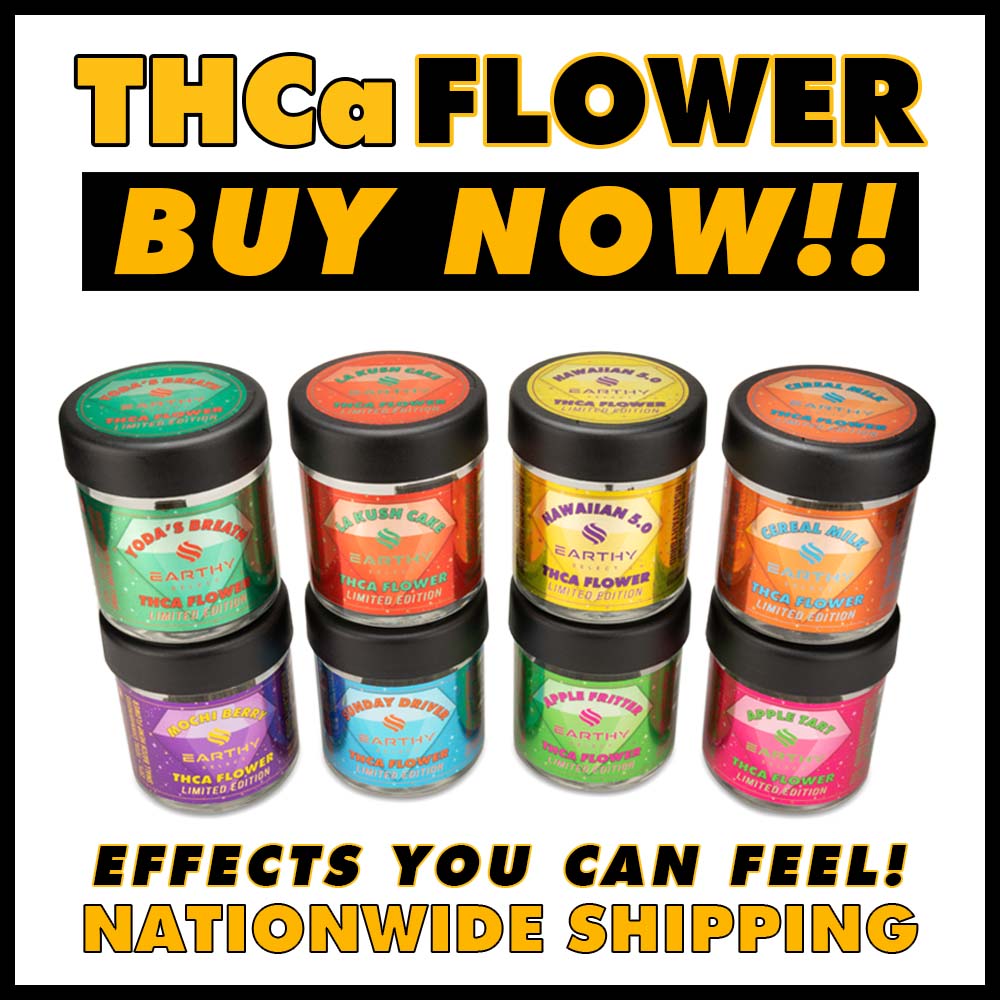Does THCa Show Up on a Drug Test?
If you consume cannabis, you’re likely familiar with THC and know that most drug tests will test for its presence. But what about THCa? Does THCa show up on a drug test? Will you test positive on a drug test if you’ve recently consumed products that contain THCa?
Though THCa is the acidic precursor of THC—and therefore non-psychoactive— many people are confused about whether or not THCa will lead to a positive drug test result.
Keep reading to learn more about what will happen on a drug test if you consume THCa. There are several key factors to keep in mind regarding THCa if you need a negative drug test result. We’ll help you understand these things and how to avoid a positive result.
What is THCa?
Tetrahydrocannabinolic acid (THCa) is a non-psychoactive cannabinoid and is one of the hundreds of chemical compounds in the cannabis flower. Because it is a cannabinoid acid, it does not give the user the euphoric high as its cousin Delta-9 THC [1].
But THCa has a unique role when it comes to its effects on the human body. In short, THCa is only non-psychoactive if it remains unheated or dried. In other words, when smoked, vaped, cooked, or exposed to consistent light, it turns to the psychoactive version of THC.
Delta-9 THC (the main psychoactive version of THC) and THCa have similar chemical structures yet different functions. For example, THCa is a cannabinoid that has changed from CBGA, the “mother of all cannabinoids,” which forms as the plant matures. Yet, because THCa has an extra molecular carboxyl ring compared to THC, the cannabinoid can’t bind to the body’s CB1 receptors to produce the same psychoactive effects as the THC. Yet, the chemical reaction when THCa is exposed to heat forms the same molecular structure of Delta-9 THC [2].
Is THCa legal?
Ultimately, the law considers THCa cannabis products federally compliant as long as they do not contain more than 0.3 percent Delta-9 THC per dry weight. Federally compliant hemp is evaluated only on its Delta-9 THC levels, not its total THC levels [2, 3].
Though it may seem counterintuitive, the THCa content of a federally compliant hemp product, like high-THCa hemp flower, may convert to the higher THC levels of its marijuana counterpart, but only if it is heated or dried. THCa only becomes potentially as psychoactive as marijuana when it is smoked, vaped, dried, or cooked, thus turning a federally compliant hemp product into something that could otherwise be considered a controlled substance.
Raw cannabis often has high levels of THCa. So if you plan to smoke, vape, or cook raw cannabis, remember that the THCa will immediately convert to Delta-9 THC, yet will retain the same legal status of its raw, unheated form. That is, as long as it is evaluated for the hemp market post-harvest. In contrast, the same plant could be evaluated differently in the regulated marijuana markets and determined to be a marijuana plant because of its “total THC” content.
These confusing differences between how hemp and marijuana plants are evaluated could potentially lead to scenarios where the same plant is labeled as both hemp and marijuana, depending on who’s measuring it and when it is measured [4].
Will THCa Show up on a drug test?
If you consume products with THCa and plan to take a drug test, you need to know if the cannabinoid will turn the results positive for THC. We’re glad you found this article because THCa will likely register as positive for THC on a drug test.
When THCa goes through decarboxylation (through heating or drying), it automatically converts to Delta-9 THC. When you consume post-decarboxylated THC or THCa, it will convert in your body to the THC metabolite THC-COOH. Most drug tests screen for THC metabolites such as THC-COOH to determine if the person has consumed THC. Thus, there’s a high likelihood that THCa will show up on urine tests and routine drug screenings [5].
Though the molecular structure of THCa is not identical to THC due to an extra carboxyl ring on THCa, you should expect that most drug tests will register traces of recently consumed THCa in your body.
In summary, both THC and THCa metabolize into THC-COOH. Additionally, THC-COOH is the substance for which urine drug screens (UDS) and other drug screenings test.
Buy THCa Flower In Georgia – Buying Guide For Best THCa
Will unheated (non-decarboxylated) THCa show up on a drug test?
The question in your mind may be: What if THCa is consumed raw without first undergoing decarboxylation? Unfortunately, whether you’re taking pure THCa (unheated) or as a decarboxylated cannabinoid in the form of Delta 9 THC, you will likely fail a THC drug test. Though there is some controversy about whether non-decarboxylated THCa will always produce a positive drug test result, it’s better to be safe than sorry. At the end of the day, the safe plan is to avoid all THC and THCa products if you plan to pass a drug test [6].
Cannabis legality and the Farm Bills
After the 2014 Farm Bill removed hemp from the Drug Enforcement Agency’s list of Schedule 1 substances, there was a boom in cannabis commercialization. The Bill made hemp, designated as cannabis with 0.3 percent or less Delta-9 THC, federally compliant and allowed long-forbidden research to begin after almost a century.
The 2018 Farm Bill then allowed the production, sale, and consumption of hemp-derived products, making it clear to legal experts that all plant materials and substances derived from legally-defined hemp are federally compliant [3]. Hemp flower with high levels of THCa falls into this category.
Cannabis plants with less than 0.3 percent of Delta-9 THC per dry weight are federally compliant hemp plants. Hemp production and consumption are federally allowed nationwide [3].
By contrast, a cannabis plant with more than 0.3 percent Delta-9 THC per dry weight is legally defined as marijuana, which federal law still treats as a controlled substance on the DEA’s Schedule 1 list. Even so, many states allow medical use and/or adult recreational use of cannabis containing much more than 0.3 percent Delta-9 THC.
Navigating the Legal Landscape of THCa: Which States Allow THCa Concentrates?
How long does THCa stay in your system?
Several factors determine how long THCa will stay in a person’s system. These factors include:
- Frequency of use
- Level of THC in an individual’s system
- Metabolism of individual
- Hydration status of individual
If the THCa has been decarboxylated, it has a long half-life. The half-life means the time it takes the concentration to decrease by half. However, half-life will also be affected by the factors above. For example, a recent study found that the half-life of THC was 1.3 days for people who used THC infrequently. For those who used THC more frequently, the half-life was between 5 and 13 days [7].
Different drug tests that may pick up THCa
Four primary types of testing may pick up even trace amounts of THC. These are:
- Saliva Tests: An absorbent pad on a stick rubs the inside of the cheek and tongue. Research shows there is significant retention of THC in the mouth after oral consumption, which increases in concentration for several hours after cannabis use.
- Urine Tests: Out of all the drug tests, THC retains the highest concentration for the longest time in urine. Because of this, urine testing is typically the preferred method to test for marijuana use.
- Hair Tests: There is a long detection window with hair testing. Hair taken from the scalp can show THC use for three months. But hair tests are not as reliable when light cannabis users are tested. One recent study showed that 75% of heavy cannabis users and only 39% of light users tested positive for THC from a hair sample.
- Blood Tests: THC stays in the blood for only a short time. Thus, these tests are not usually used. While THC reaches the bloodstream within minutes after use, the concentrations in the bloodstream decrease rapidly after three or four hours [7].
Delta-9 vs THCa
The key distinction between THCa and Delta-9 THC is that THCa does not induce the intoxicating effects associated with Delta-9 THC. Did you know that hemp derived Delta-9 THC is lawful under the Farm Bill? The natural THCa in a raw cannabis plant has cannabinoid acids that preclude any bond with the cannabinoid receptors in the human body that deal with psychoactive cannabinoids. But heat will convert THCa to psychoactive THC. This metamorphosis occurs when one of the carboxyl rings in the THCa is removed, thus enabling it to produce intoxicating effects by binding to the CB1 receptors in our endocannabinoid system [2].
Regarding other therapeutic benefits, THCa and THC may overlap in certain areas. Both cannabinoids have been linked with benefits such as nausea relief, better sleep, and chronic pain relief, but more research is needed to know if and how each cannibinoid may help in these areas.
How THCa becomes THC
The difference between THC and THCa amounts to one carboxyl ring. Heating THCa will remove this ring, making the cannabinoid the same as psychoactive THC.
THCa turns into THC through decarboxylation. This chemical reaction relies on heat or light to remove one carboxyl group from the acidic cannabinoid. “Decarbing” allows various cannabinoids to interact with our endocannabinoid receptors differently.
Once THCa undergoes decarboxylation, it loses the extra carboxylic acid group and converts to THC. This change turns it into the perfect shape for the CB1 receptors in the endocannabinoid system, triggering the mind-altering effects of THC [8].
Health benefits of THCa: what the research shows
Unlike THC, THCa will not produce a psychoactive effect unless decarboxylated first. However, some people enjoy consuming raw cannabis for its pure THCa content. For example, juicing or taking THCa tinctures are popular ways of taking advantage of the acidic cannabinoid without experiencing intoxication. Various products may also be made from THCa isolate.
Some recent studies have shown that THCa may offer potential neuroprotective qualities and, with further research, may shed light on alternative treatments for preventing neurodegenerative diseases like Huntington’s disease. However, more research is needed [9].
Does THCa get you high?
In and of itself, THCa does not get you high. In its acidic form, as in freshly harvested cannabis, THCa will not adhere to your CB1 receptors like psychoactive THC. Smoking, vaping or cooking THCa will yield cannabis with psychoactive potential.
Does THCa show up on a drug test? Final Thoughts
If you’re concerned about how THCa might affect a drug test, it’s important to remember these things:
- THCa converts into THC when consumed or heated. Both forms are eventually broken into the metabolite THC-COOH.
- Many drug tests screen for THC-COOH.
- When you consume THCa, it may turn a drug test for THC positive.
- THCa can stay in your system for months.
- The amount of time THCa or THC stays in your system depends on various factors [5].
And remember that if you’re looking for premium and federally compliant products, you can order THCa flower and order THCa Pre-Rolls online!
Keep reading: The Ultimate Guide to THCa Flower
Medical Disclaimer / Legal Disclaimer – Information is provided for educational purposes. It does not and is not intended to constitute legal advice or medical advice. We attempt to be accurate and up-to-date, but the legality of cannabinoids and the science of cannabis are evolving. The author is neither a legal professional nor a medical expert. Before buying or using any products, you should check with your local authorities and medical providers.
References
- What is THCA and what are the benefits of this cannabinoid?
- Demystifying The Differences Between THCa And THC.
- HIA Position Statement on Delta-8 and Hemp Cannabinoids
- THCa Flower – The Next Big Thing in Hempland?
- THCa Drug Test: Will I Test Positive?
- THCa Drug Test – Why You Will Fail
- How Long Does Marijuana (Weed) Stay in Your System?
- Decarboxylation guide: How to properly decarb weed
- What is THCA and what are the benefits of this cannabinoid?
- Endocannabinoid system in irritable bowel syndrome and cannabis as a therapy
Frequently Asked Questions
Is THCa psychoactive?
THCa does not have psychoactive properties unless it has been decarboxylated.
How long does THCa stay in your system?
Though the answer to this depends on what kind of test is taken and specifics about the individual, Medical News Today reported that first-time cannabis smokers may have cannabis detected for “about 3 days,” while smokers who partake three to four times per week may have it detected for “5-7 days.” Tests can detect THC in heavy smokers “for at least 30 days [10].”
What is a THCa flower high?
A THCa hemp flower high can often be described as involving feelings of euphoria and potent properties that often lead to an increased sense of well-being and focus. Expect an energizing and uplifting head-high experience with a sativa strain. With an indica strain, the experience is generally more of a relaxing body buzz and deep relaxation. Keep in mind that since everyone’s system is different, results and strengths of effects will vary.





